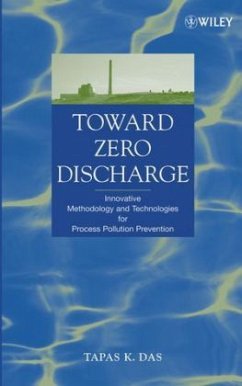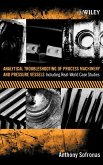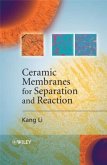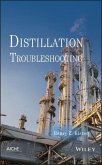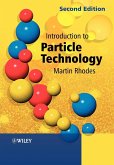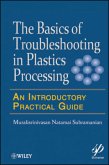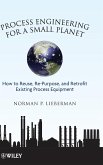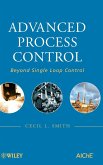Toward Zero Discharge
Innovative Methodology and Technologies for Process Pollution Prevention
Ed. by Tapas K. Das
Toward Zero Discharge
Innovative Methodology and Technologies for Process Pollution Prevention
Ed. by Tapas K. Das
- Gebundenes Buch
- Merkliste
- Auf die Merkliste
- Bewerten Bewerten
- Teilen
- Produkt teilen
- Produkterinnerung
- Produkterinnerung
This book discusses pathways to achieve pollution prevention and waste minimization at the sources leading toward zero discharge. Coverage includes life cycle assessment, industrial ecology, eco-industrial parks, green engineering, and sustainable chemical and allied processes and products development. The pulp and paper industry is introduced as a case study in demonstrating how this industry is achieving pollution prevention goals by various techniques, and how this industry has become a minimum impact industry, moving towards achieving zero discharge status in most process areas. Featuring…mehr
![Analytical Troubleshooting of Process Machinery and Pressure Vessels Analytical Troubleshooting of Process Machinery and Pressure Vessels]() Anthony SofronasAnalytical Troubleshooting of Process Machinery and Pressure Vessels150,99 €
Anthony SofronasAnalytical Troubleshooting of Process Machinery and Pressure Vessels150,99 €![Ceramic Membranes for Separation and Reaction Ceramic Membranes for Separation and Reaction]() Kang LiCeramic Membranes for Separation and Reaction222,99 €
Kang LiCeramic Membranes for Separation and Reaction222,99 €![Distillation Troubleshooting Distillation Troubleshooting]() Henry Z. KisterDistillation Troubleshooting163,99 €
Henry Z. KisterDistillation Troubleshooting163,99 €![Introduction to Particle Technology Introduction to Particle Technology]() Martin RhodesIntroduction to Particle Technology89,99 €
Martin RhodesIntroduction to Particle Technology89,99 €![Basics of Troubleshooting in Plastics Processing Basics of Troubleshooting in Plastics Processing]() Muralisrinivasan Natamai SubramanianBasics of Troubleshooting in Plastics Processing158,99 €
Muralisrinivasan Natamai SubramanianBasics of Troubleshooting in Plastics Processing158,99 €![Process Engineering for a Small Planet Process Engineering for a Small Planet]() Norman P LiebermanProcess Engineering for a Small Planet111,99 €
Norman P LiebermanProcess Engineering for a Small Planet111,99 €![Advanced Process Control Advanced Process Control]() Cecil L SmithAdvanced Process Control138,99 €
Cecil L SmithAdvanced Process Control138,99 €-
-
-
Featuring a collection of expert authors, this book is essential reading for industrial ecologists and engineers, material scientists, and state and federal officials.
- Produktdetails
- Verlag: Wiley & Sons
- 1. Auflage
- Seitenzahl: 752
- Erscheinungstermin: 1. März 2005
- Englisch
- Abmessung: 241mm x 164mm x 39mm
- Gewicht: 1160g
- ISBN-13: 9780471469674
- ISBN-10: 047146967X
- Artikelnr.: 13481170
- Verlag: Wiley & Sons
- 1. Auflage
- Seitenzahl: 752
- Erscheinungstermin: 1. März 2005
- Englisch
- Abmessung: 241mm x 164mm x 39mm
- Gewicht: 1160g
- ISBN-13: 9780471469674
- ISBN-10: 047146967X
- Artikelnr.: 13481170
Defining Pollution Prevention. 1.3 The Zero Discharge Paradigm. 1.4 The
Structure of the Book. PART I: METHODOLOGY. 2 ZERO DISCHARGE INDUSTRIES.
2.1 Sustainability, Industrial Ecology and Zero Discharge. 2.2 Why Zero
Discharge is Critical to Sustainability. 2.3 The New Role of Process
Engineers and Engineering Firms. 2.4 Zero Discharge Methodology. 2.5 Making
the Transition. 2.6 In the Full Zero Discharge Paradigm. 2.7 Separation--A
Key Conversion Technology. 2.8 Constraints and challenges. 3 FUNDAMENTALS
OF LIFE CYCLE ASSESSMENT. 3.1 What is Life Cycle Assessment? 3.2 Conducting
LCA. 3.3 LCA and LCI Software Tools. 3.4 Evaluating the Life Cycle
Environmental Performance of Two Disinfection Technologies. 3.5 Case Study:
Comparison of LCA of Electricity from Biorenewables and Fossil Fuels. 4
ASSESSMENT AND MANAGEMENT OF HEALTH AND ENVIRONMENTAL RISKS. 4.1 Health
Risk Assessment. 4.2 Assessing the Risks of Some Common Pollutants. 4.3
Ecological Risk Assessment. 4.4 Risk Management. 4.5 Communicating
Information on Environmental and Health Risks. 4.6 Environmental
Information on the Internet. 5 ECONOMICS OF POLLUTION PREVENTION: TOWARD AN
ENVIRONMENTALLY SUSTAINABLE ECONOMY. 5.1 Economics of Pollution Control
Technology. 5.2 Best Available Control Technology: Application to Gas
Turbine Power Plants. 5.3 Case Study: The North Carolina Clean Smokestacks
Plan. 5.4 Sustainable Economy and The Earth. 6 SUSTAINABILITY AND
SUSTAINABLE DEVELOPMENT. 6.1 Introduction. 6.2 Sustainable Production and
Growth for the Chemical Process Industries. 6.3 Integrating Life Cycle
Assessment in Sustainable Product Development. 6.4 Biorenewable Energy
Resources. 6.5 Applying the Metrics of Sustainability to Transform Business
Practices and Public Policy. 6.6 Toward a Hydrogen-based Sustainable
Economy. 6.7 Bio-Based Chemicals and Engineered Materials. 6.8
Eco-Efficiency and Eco-industrial Parks. 6.9 Process Intensification and
Microchannel Reaction. PART II: TECHNOLOGIES AND APPLICATIONS 7 ZERO
DISCHARGE TECHNOLOGY. 7.1 Zero Water Discharge Systems. 7.2 Case Study: Gas
Turbine NOx Emissions at General Electric. 7.3 Questions of Regulatory
Policy. 7.4 Smokestack Emissions. 7.5 Eco-Industrial Parks: Model Zero
Discharge Communities. 8 TECHNOLOGIES FOR POLLUTION PREVENTION: AIR. 8.1
Some On-going Pollution Prevention Technologies. 8.2 Some Emerging and
Innovative Processes. 9 TECHNOLOGIES FOR POLLUTION PREVENTION: WATER. 9.1
Advances in Wastewater Treatment Technologies. 9.2 Some Emerging and
Innovative Processes. 9.3 Groundwater Quality. 10 TECHNOLOGIES FOR
POLLUTION PREVENTION: SOLID WASTE. 10.1 Solid Waste Treatment: Some
Perspectives on Recycling. 10.2 Plastic Recycling in a Developing Country:
A Paradoxical Success Story. 10.3 From Waste to Energy: Catalytic Steam
Gasification of Poultry Litter. 11 MINIMIZATION OF ENVIRONMENTAL DISCHARGE
THROUGH PROCESS INTEGRATION. 11.1 Energy Integration and Heat Exchange
Networks. 11.2 Mass Integration. 11.3 Water Optimization and Integration.
11.4 Industrial Applications of Heat Integration and Mass Integration. 11.5
Further Reading. 11.6 Final Thoughts. 12 PROCESS POLLUTION PREVENTION IN
THE PULP AND PAPER INDUSTRY. 12.1 Environmental Management in the Pulp and
Paper Industry. 12.2 Pollution Prevention in the Pulp and Paper Industry.
12.3 Resource Recovery and Reuse. 13 PROGRESS TOWARD ZERO DISCHARGE IN PULP
AND PAPER PROCESS TECHNOLOGIES. 13.1 Three Case Studies. 13.2 Additional
Concerns Addressed by Zero Discharge Technology. 13.3 Other Emission
Recovery and Control Processes. 13.4 Conclusions. Epilogue -- Final
Thoughts. Index.
Defining Pollution Prevention. 1.3 The Zero Discharge Paradigm. 1.4 The
Structure of the Book. PART I: METHODOLOGY. 2 ZERO DISCHARGE INDUSTRIES.
2.1 Sustainability, Industrial Ecology and Zero Discharge. 2.2 Why Zero
Discharge is Critical to Sustainability. 2.3 The New Role of Process
Engineers and Engineering Firms. 2.4 Zero Discharge Methodology. 2.5 Making
the Transition. 2.6 In the Full Zero Discharge Paradigm. 2.7 Separation--A
Key Conversion Technology. 2.8 Constraints and challenges. 3 FUNDAMENTALS
OF LIFE CYCLE ASSESSMENT. 3.1 What is Life Cycle Assessment? 3.2 Conducting
LCA. 3.3 LCA and LCI Software Tools. 3.4 Evaluating the Life Cycle
Environmental Performance of Two Disinfection Technologies. 3.5 Case Study:
Comparison of LCA of Electricity from Biorenewables and Fossil Fuels. 4
ASSESSMENT AND MANAGEMENT OF HEALTH AND ENVIRONMENTAL RISKS. 4.1 Health
Risk Assessment. 4.2 Assessing the Risks of Some Common Pollutants. 4.3
Ecological Risk Assessment. 4.4 Risk Management. 4.5 Communicating
Information on Environmental and Health Risks. 4.6 Environmental
Information on the Internet. 5 ECONOMICS OF POLLUTION PREVENTION: TOWARD AN
ENVIRONMENTALLY SUSTAINABLE ECONOMY. 5.1 Economics of Pollution Control
Technology. 5.2 Best Available Control Technology: Application to Gas
Turbine Power Plants. 5.3 Case Study: The North Carolina Clean Smokestacks
Plan. 5.4 Sustainable Economy and The Earth. 6 SUSTAINABILITY AND
SUSTAINABLE DEVELOPMENT. 6.1 Introduction. 6.2 Sustainable Production and
Growth for the Chemical Process Industries. 6.3 Integrating Life Cycle
Assessment in Sustainable Product Development. 6.4 Biorenewable Energy
Resources. 6.5 Applying the Metrics of Sustainability to Transform Business
Practices and Public Policy. 6.6 Toward a Hydrogen-based Sustainable
Economy. 6.7 Bio-Based Chemicals and Engineered Materials. 6.8
Eco-Efficiency and Eco-industrial Parks. 6.9 Process Intensification and
Microchannel Reaction. PART II: TECHNOLOGIES AND APPLICATIONS 7 ZERO
DISCHARGE TECHNOLOGY. 7.1 Zero Water Discharge Systems. 7.2 Case Study: Gas
Turbine NOx Emissions at General Electric. 7.3 Questions of Regulatory
Policy. 7.4 Smokestack Emissions. 7.5 Eco-Industrial Parks: Model Zero
Discharge Communities. 8 TECHNOLOGIES FOR POLLUTION PREVENTION: AIR. 8.1
Some On-going Pollution Prevention Technologies. 8.2 Some Emerging and
Innovative Processes. 9 TECHNOLOGIES FOR POLLUTION PREVENTION: WATER. 9.1
Advances in Wastewater Treatment Technologies. 9.2 Some Emerging and
Innovative Processes. 9.3 Groundwater Quality. 10 TECHNOLOGIES FOR
POLLUTION PREVENTION: SOLID WASTE. 10.1 Solid Waste Treatment: Some
Perspectives on Recycling. 10.2 Plastic Recycling in a Developing Country:
A Paradoxical Success Story. 10.3 From Waste to Energy: Catalytic Steam
Gasification of Poultry Litter. 11 MINIMIZATION OF ENVIRONMENTAL DISCHARGE
THROUGH PROCESS INTEGRATION. 11.1 Energy Integration and Heat Exchange
Networks. 11.2 Mass Integration. 11.3 Water Optimization and Integration.
11.4 Industrial Applications of Heat Integration and Mass Integration. 11.5
Further Reading. 11.6 Final Thoughts. 12 PROCESS POLLUTION PREVENTION IN
THE PULP AND PAPER INDUSTRY. 12.1 Environmental Management in the Pulp and
Paper Industry. 12.2 Pollution Prevention in the Pulp and Paper Industry.
12.3 Resource Recovery and Reuse. 13 PROGRESS TOWARD ZERO DISCHARGE IN PULP
AND PAPER PROCESS TECHNOLOGIES. 13.1 Three Case Studies. 13.2 Additional
Concerns Addressed by Zero Discharge Technology. 13.3 Other Emission
Recovery and Control Processes. 13.4 Conclusions. Epilogue -- Final
Thoughts. Index.

